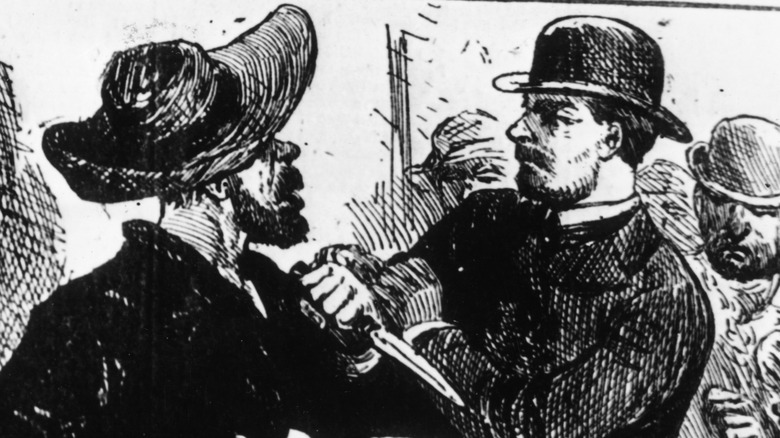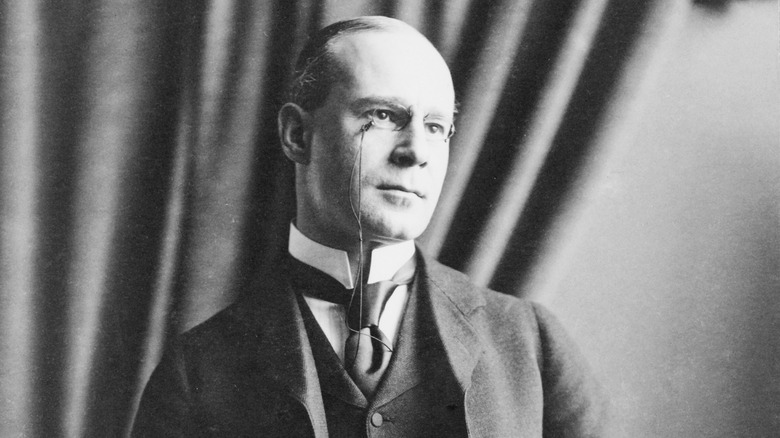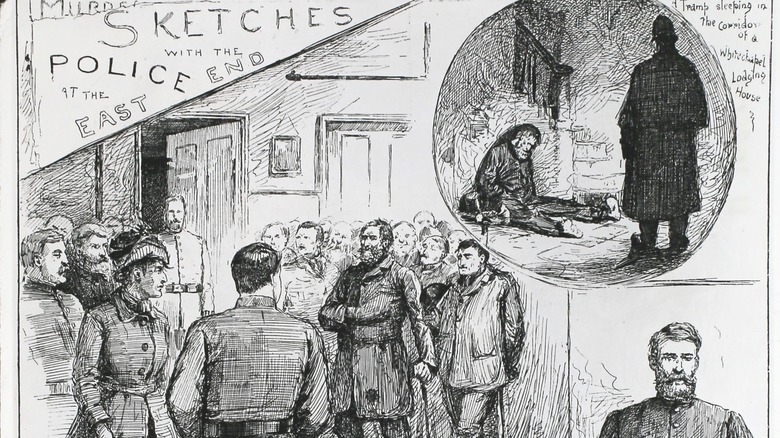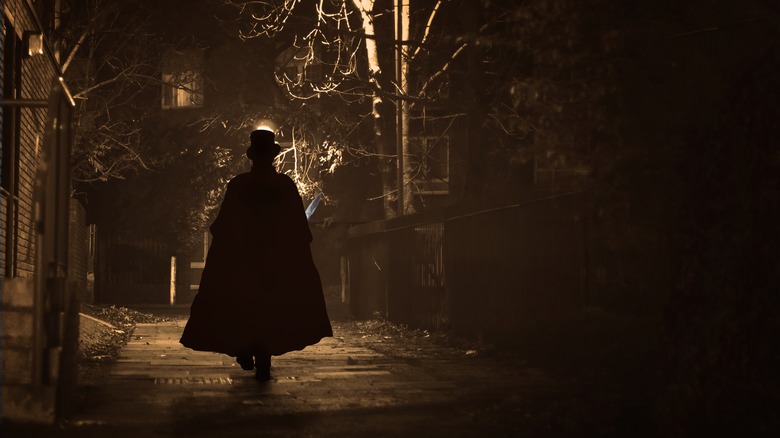The Truth About Jekyll And Hyde's Connection To Jack The Ripper
In the mid-1880s, writer Robert Louis Stevenson had a nightmare that would creep onto the page, then onto the stage, and even infiltrate the streets of London. According to Salon, Stevenson wrote a story inspired by the nightmare in just three days. "The Strange Case of Dr. Jekyll and Mr. Hyde," released in January 1886, tells the tale of the respected, London-based Dr. Henry Jekyll, who transforms at night into the murderer Mr. Hyde. It is eventually revealed that Dr. Jekyll developed this split personality through a spoiled batch of drugs.
In 1888, approximately two years after Stevenson's story was released, a serial killer dubbed Jack the Ripper began terrorizing the streets of London. The criminal mutilated and murdered multiple prostitutes in the city's Whitechapel district, according to History. The question of the killer's identity has never been answered.
But beyond their shared time period and London location, how do these two stories — one fact, one fiction — connect to one another?
Actor Richard Mansfield's performance as Jekyll & Hyde haunted audience members
In August of 1888, two horrifying series of events began. One was the string of murders tied to Jack the Ripper, which took place between August 7 and September 10, per History. The other was the opening of a stage play adaptation of "The Strange Case of Dr. Jekyll and Mr. Hyde," starring Richard Mansfield in the titular double role, per the British Library.
Crowds gathered at the Lyceum Theatre in London's West End to see Mansfield's terrifying transformation. "The most racking pangs succeeded: a grinding in the bones, deadly nausea, and a horror of the spirit that cannot be exceeded at the hour of birth or death," Stevenson wrote of the transformation that served as the centerpiece of both the story and the play. "Then these agonies began swiftly to subside, and I came to myself as if out of a great sickness. There was something strange in my sensations, something indescribably sweet."
Mansfield was regarded as an astonishing actor, and he conveyed this scene with unsettling effectiveness. "Every one speculated on the secret of the transformation which they saw yet could not believe," read one obituary (via Salon). According to Salon, theories as to how Mansfield managed to put forth such a convincing display ranged from makeup and lighting tricks to potent chemicals and an inflatable rubber suit. In any case, he seemed to be truly overcome by evil, and the spectacle shook and mystified the audience as much as the mystery of Jack the Ripper soon would.
Some suspected that Jack the Ripper was Richard Mansfield's 'Mr. Hyde'
Three weeks after Mansfield's performance of "The Strange Case of Dr. Jekyll and Mr. Hyde" debuted on the West End of London, a prostitute was found murdered on the city's East End. The murder marked the known beginning of the Jack the Ripper killings.
According to the British Library, newspapers at the time often referred to the unidentified killer as "Mr. Hyde." Because the story of Jekyll and Hyde follows a man who is a respected member of society by day and a bloodthirsty villain at night, some even suspected that the esteemed actor Mansfield was the killer. "I should be the last to think because a man takes a dreadful part he is therefore bad, but when I went to see Mr. Mansfield take the part of Dr. Jekyll and Mr. Hyde, I felt at once that he was the man wanted," one member of the public wrote to the police (via the British Library). "I do not think there is a man Living so well able to disguise himself in a moment as he does in front of the public..."
Dramatic reactions from the public led the Jekyll & Hyde play to close early
The London public drew parallels between Jack the Ripper's reported medical skill and Dr. Jekyll's medical background as described in "The Strange Case of Dr. Jekyll and Mr. Hyde." According to Salon, a newspaper at the time reported that someone who had seen the play was deeply disturbed thereafter. "A well-dressed young man ... bolted out of a 'bus while it was going at a rapid rate, and then [fell] down in a fit," the article read (via Salon). "It appeared that he had been to see Mr. [Richard] Mansfield as Dr. Jekyll, and on getting into the 'bus found himself beside a most repulsive-looking man, whom he immediately concluded must either be the Doctor himself or the Whitechapel Murderer. In a fit of fearful nervousness, he jumped from his seat, and came to grief as mentioned."
According to the British Library, after such extreme reactions to Robert Louis Stevenson's story and Mansfield's performance, the play ended up closing early as a matter of taste. But one thing that never closed — at least, not with any certainty — was the case of Jack the Ripper.



